697 Search Results for model
March 9, 2016
by Carole Zangari -
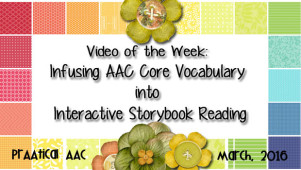
Reading is such a great activity to build language skills in AAC learners, but it takes some practice to get the hang of how to engage our partners, model language, and create communication opportunities. We’re off to New Zealand today to the Kimi Ora School in the Wellington region for a demonstration that shows how we can provide some aided language input and opportunities for core word use in interactive storybook reading.
February 29, 2016
by Carole Zangari -
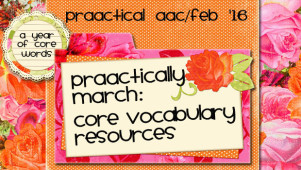
Why spend valuable intervention time teaching words that relate only to one specific activity or environment when you could be teaching words that the learner can use all day long? Building competency with a robust base of 300-500 core words gives people the vocabulary they need to function in any environment. (Try that with AAC systems that are mostly nouns and action verbs!). How can we continually increase our clients’ competence with core words? A few years ago, we decided to approach this by focusing on 12-16 core words each month. Each month, we would highlight those words in our conversation (aided language input), direct intervention, and home programming activities with AAC learners. The repeated experiences with those 12-16 words helped the learners develop new skills, and kept the team focused on the same things. An added bonus: We were less likely to be overwhelmed. It’s gratifying to see many... [Read More...]
February 23, 2016
by Carole Zangari -
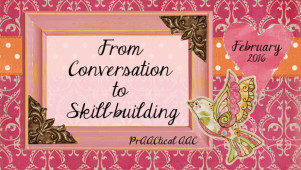
AAC learners need a lot of support as they build the skills needed to have rich and effective conversations. Often, their role in the conversation is punctuated with partners’ reliance on context, prior knowledge, and questions to make sense of the message. What do we do when the learner gives us partial information or uses language skills below his/her capability? Do we accept the limited language so that we get to the bottom of the message our learner is trying to express? Or do we use it as an opportunity to shape improved language skills? One approach to making this decision is to start with a question. “What is the top priority for this interaction?” Making a decision about the most important goal of the conversation is a critical step in determining how to respond. In some cases, the time is right to use the opportunity to improve skills in... [Read More...]
February 15, 2016
by Carole Zangari -
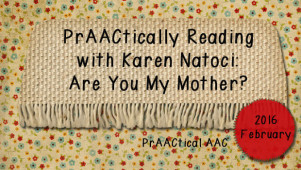
We get many requests to do more posts on providing AAC supports to children who use alternative access. Karen Natoci must have read my mind when she wrote this month’s PrAACtically Reading post because she gave us lots of ideas for shared reading with a child who is learning to use eye gaze for communication. The book that she chose is a P.D. Eastman classic that many of us remember from our own childhoods. Happy reading! Shared Reading Using Eye Gaze Book: Are You My Mother? by P.D. Eastman CORE Words to practice using: you, want, where, look, more, no, go, like, oh no! mine FRINGE Words to practice using: Animal names, mother, snort!! I am happy to share this lesson plan to describe the integration of early eye gaze and switch use to foster engagement while reading the delightful book, Are you My Mother? (authored by P.D. Eastman). Today, I chose... [Read More...]
February 2, 2016
by Carole Zangari -
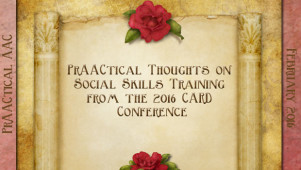
I had a wonderful time this past weekend connecting with colleagues and learning from ASD experts at the 2016 Center for Autism and Related Disabilities (CARD) Conference in Orlando. One of the keynotes, “From Building Social Relationships to Improved Quality of Life Outcomes for Youth on the Autism Spectrum: We Finally Know What We Already Knew,” was given by Dr. Scott Bellini. I also attended his talk on the Building Social Relationships program. Here are some of the take-aways from those two sessions. Evidence Base The evidence base for social skills training is variable. While his meta-analysis on school-based social skills training found that social skills interventions were minimally effective, there are several effective strategies that can be used in that and other settings. When evidence-based strategies, including video modeling and video self-modeling and social narratives, are used within the context of social skills training, the overall efficacy is much greater. The evidence... [Read More...]
January 28, 2016
by Carole Zangari -
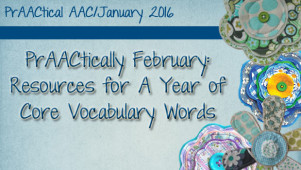
Are you looking for some ways to help your AAC learners become more fluent in using core vocabulary? One approach to boosting practice opportunities is to select a dozen or so core words to focus on each month. Throughout the month, we can then pay special attention to that small group of words by highlighting them with focused language stimulation, aided language input, and specific activities designed to teach or practice those words, In previous years, we shared lists of some core words to help you do just that. You can learn more about that in the posts linked below. Set 1 (2013: 12 words/month) Set 2 (2014: 16 words/month) It’s been a busy January, and now it’s time to prepare the next set of core vocabulary words. Our words for February are listed below. Set 1: again, eat, get, go, happy, here, look, I/me, on, play, put, this Set... [Read More...]
January 19, 2016
by Carole Zangari -
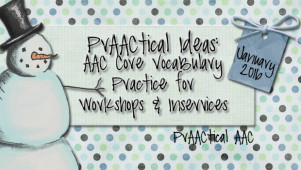
Doing a training or workshop on core vocabulary? Looking to help a team get more fluent in AAC modeling? Teaching an AAC course to graduate students? There are lots of you out there spreading the word about AAC, core vocabulary, and aided language input. Whether you are doing an informal training, presenting a workshop or teaching a class, you may be interested in giving the participants some hands-on practice with core words. If so, here’s a fun activity to help get them engaged. Get ready for…Battleship, AAC Edition! Battleship is a barrier game in which two players cannot see each other’s game boards. The game boards consist of identical grids, labeled with players placing their battleships somewhere on the board. They take turns calling out coordinates to find and sink one another’s battleship. You can learn more about how to play the game and see the game boards here. Teachers have... [Read More...]
January 7, 2016
by Carole Zangari -
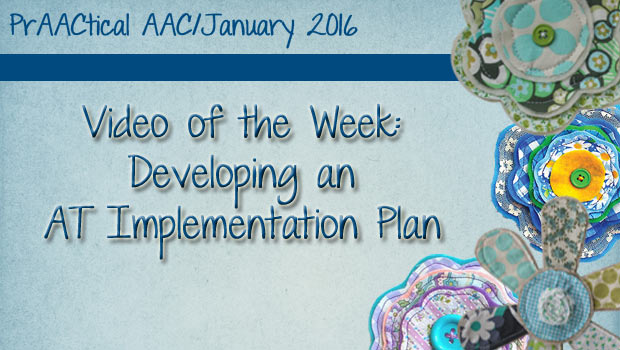
Gianna’s teacher uses a visual schedule app successfully in the classroom to support comprehension and reduce problem behaviors. Although she’s shared the strategy and the app with the SLP and OT, neither one consistently use the visual schedule app in their sessions with this student. Jordan’s SLP does her best to use aided language input to provide a competent model of linguistic expression using his SGD when she pushes in to provide services in the classroom. Once she’s gone, classroom staff rarely implement that strategy or create opportunities for Jordan to use the SGD at other times during the school day. Evan’s parents have made an enormous investment in learning about AAC and modeling core words at home to help their son develop stronger skills with his AAC app. They do their best to follow along with the Year of Core Vocabulary Words approach, and are understandably dismayed when the... [Read More...]
December 29, 2015
by Carole Zangari -
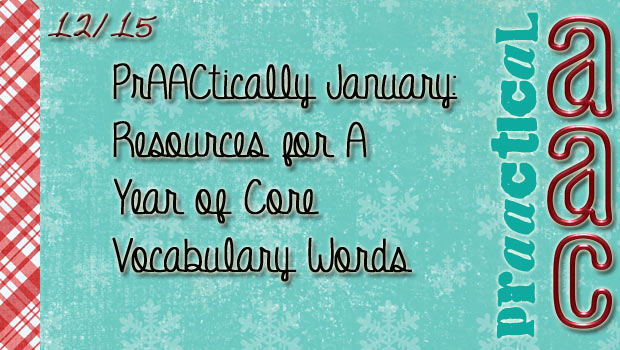
Taking down the Christmas tree Chilling a bottle of champagne Reflecting on New Year’s resolutions Is it really possible that, in another few days, we’ll be saying goodbye to 2015? As we welcome another prAACtical year, it’s time to start preparing the materials we’ll need to model and teach core words to our AAC learners. Next week, we’ll talk more about the instructional methods to use with these materials. For now, though, our focus is on getting the word cards and other materials for the Year of Words (Set 1/2013; Set 2/2014) ready to use with the AAC learners in our lives. Thanks to the kindness of PrAACtical AAC readers we have posts with a variety of resources: Minspeak/Unity version: Set 1/2013 PCS versions: Set 1/2013 , Set 2/2014 Speak for Yourself version: Set 2/2014 SymbolStix version: Set 1/2013 Lesson Pix: Set1/2013 We are so appreciative for the support of... [Read More...]
December 28, 2015
by Carole Zangari -
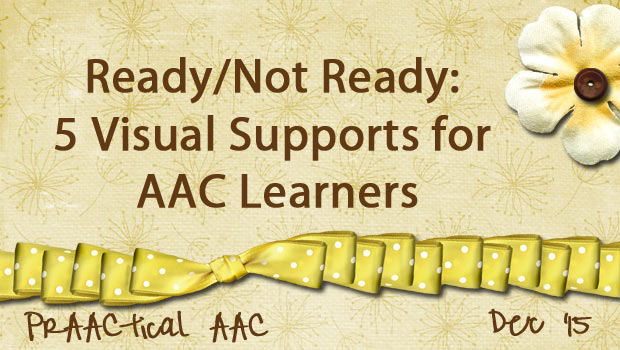
Some of us aren’t feeling quite ready to go back to work after the holidays. Like use, many AAC learners need help to get their minds and bodies prepared for activities and experiences. Here are some ready/not ready resources that can help us prepare them to cope with things to come. This simple version, by Amanda Sajac, can be a good starting point for introducing the concept through modeling. Kelli Proulx’s visual support has full messages that can be used as a manual communication board or made into an overlay for a low tech SGD. We can’t assume that AAC learners share our idea of what it means to be ready, so teaching this in an explicit way makes a lot of sense. AAC Lab created several visual supports to show what ready looks like and what behaviors indicate that we are NOT ready. Sometimes it can be helpful to create... [Read More...]









